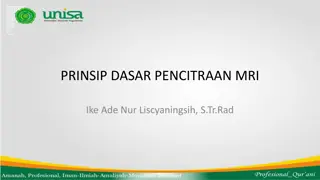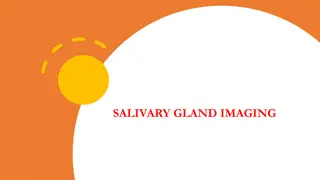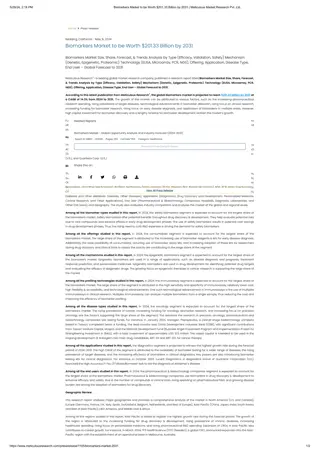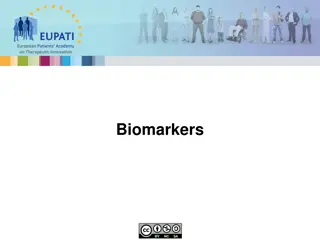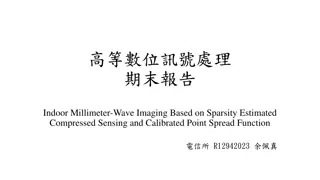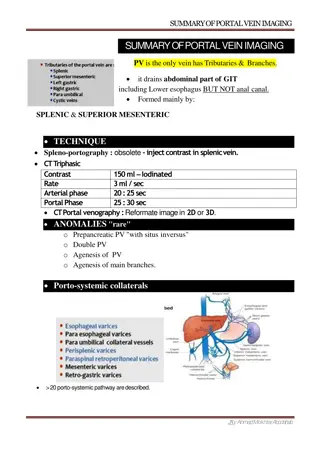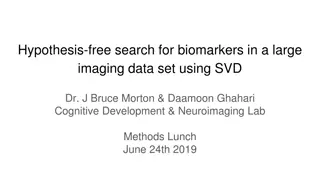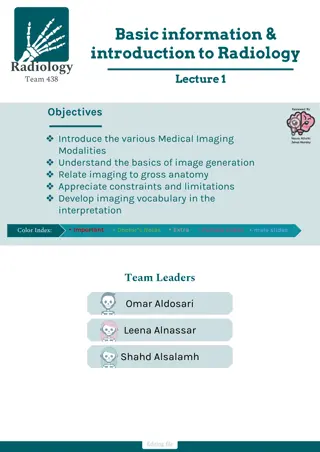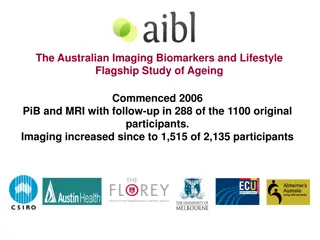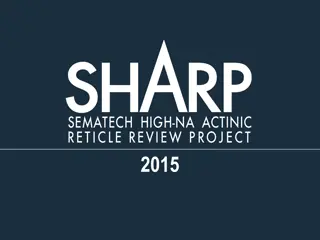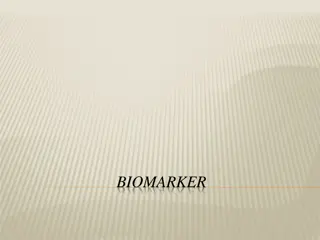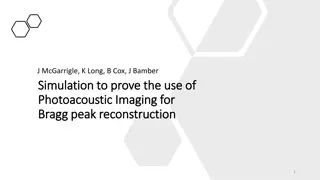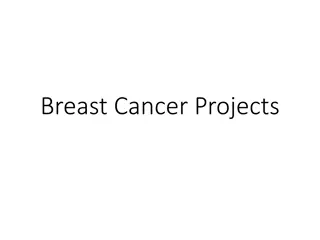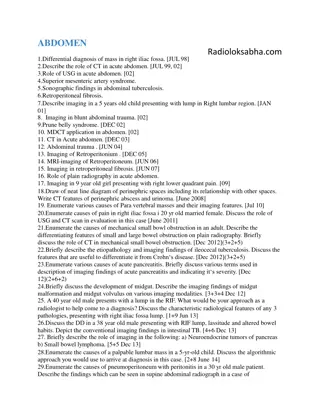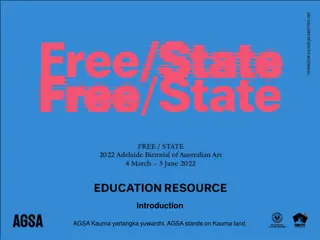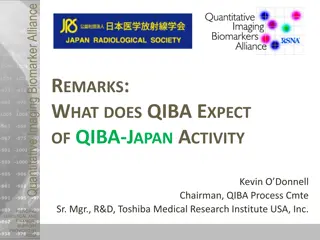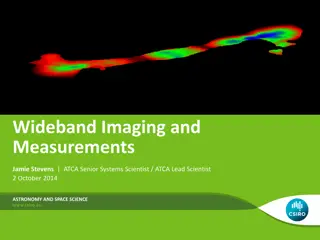Australian Imaging Biomarkers and Lifestyle Study: Progress and Focus
The Australian Imaging Biomarkers and Lifestyle Study of Ageing (AIBL) commenced in late 2006, with a cohort size and follow-up progress detailed. The study includes assessments and biomarker imaging, such as MRI, amyloid PET, and tau PET scans, with ongoing review cycles and data additions. Current focus areas involve blood biomarkers, collaborations for Alzheimer's disease research, and automated analysis tools like CapAIBL for MRI and PET imaging. Detailed conversion equations for amyloid PET scans and collaborative efforts with external parties are highlighted.
Download Presentation

Please find below an Image/Link to download the presentation.
The content on the website is provided AS IS for your information and personal use only. It may not be sold, licensed, or shared on other websites without obtaining consent from the author. Download presentation by click this link. If you encounter any issues during the download, it is possible that the publisher has removed the file from their server.
E N D
Presentation Transcript
. The Australian Imaging Biomarkers and Lifestyle Study of Ageing Commenced late 2006 CSIRO Logo Austin Health Edith Cowan University
AIBL cohort : Number of assessments 0m 1476 394 427 17 18m 1034 174 286 7 36m 776 107 219 10 54m 684 79 127 12 72m 523 59 68 8 90m 419 34 44 6 108m 376 28 30 3 126m 219 19 6 2 CN MCI AD Other Total 2314 1501 1112 902 658 503 437 246 Cumulative Withdrawn 468 681 838 986 1066 1129 1153 % Follow up complete 81% 68% 61% 49% 40% 37% 21%
Progress Baseline assessment in 2314 subjects with MRI and amyloid PET in 75% but 95% of recruits since 2013. 10.5 year review cycle almost complete. Amyloid PET and MRI at 0, 18, 38 months then every 3 years Tau PET 120 THK5351, 110 AV1451, 25 MK6240 baseline. 80 repeat scans - all AV1451. CSF in 250 subjects but not serial. All amyloid scans are now F-18 NAV4694 All tau scans are now F-18 MK6240
Progress Adding amyloid scan classification to AIBL data on GAAIN. All amyloid PET results now available in Centiloids.
Conversion Equations Florbetaben CL = 153.4*SUVrsm 155 PiB CL = 93.7*SUVrsm 94.6 NAV4694 CL = 85.3*SUVrsm 88 Florbetapir CL = 175.4*SUVrsm 182.3 Flutemetamol CL = 121.4*SUVrsm 121.2 sm = Standard Centiloid Method using SPM8 and ROI from centiloid site on GAAIN
Current Focus Blood biomarkers. Collaboration with multiple external parties. Good results from Japanese collaboration (Nakamura A, et al. High performance plasma amyloid- biomarkers for Alzheimer s disease. Nature 2018 doi:10.1038/nature25456). Pooling of data with other large cohorts (academic and commercial initiatives) Supporting clinical drug trials in preclinical and prodromal AD Evaluating tau tracers Genetic (e4, BDNF, aquaporin 4, CLU, KIBRA, polygenic risk scores, etc) and lifestyle (diet, exercise, sleep) analysis Retinal scans (multispectral; curcumin) CapAIBL Automated analysis package for MRI volumes, amyloid and tau PET. ADNeT, the Australian Dementia Network.
CapAIBL http://milxcloud.csiro.au PET only quantification of Amyloid PET images (11C- PiB, 18F-Florbetapir, 18F-FDG, 18F-Florbetaben, 18F- Flutemetamol and 18F-NAV4694) Centiloid quantification for 11C-PiB, 18F-Florbetaben and 18F-NAV4694 PDF reports emailed at the end of processing 20 minutes per scan Supports Dicom upload
CapAIBL http://milxcloud.csiro.au
The Australian Dementia Network $20 million funding over 5 years from July 1, 2018. Clinical Quality Registry for newly diagnosed dementia or MCI Memory Clinics expand, standardize and support Clinical Trial sites expand and support Longitudinal (n=4,000) and Trial ready (n=500) cohorts blood, MRI, cognition, amyloid and tau PET every 18 months +/- CSF
Problems for AIBL Funding will merge with ADNeT Retaining amyloid positive participants for longitudinal study most going into drug trials.
Expression of interest for collaboration or more in-depth data access should go to: Christopher Fowler - AIBL Co-ordinator christopher.fowler@florey.edu.au
ACKNOWLEDGEMENTS AIBL would like to thank the study participants and their families AIBL Study team David Ames Jenalle Baker Mary Barnes Kevin Barnham Shayne Bellingham Sabine Bird Julia Bomke Pierrick Bourgeat Sveltana Bozinovski (nee Pejoska) Belinda Brown Rachel Buckley Samantha Burnham Ashley Bush Lesley Cheng Steven Collins Ian Cooke Elizabeth Cyarto David Darby James Doecke Vincent Dore Denise El-Sheikh Michael Fenech Shane Fernandez Binosha Fernando Christopher Fowler Maxime Francois Jurgen Fripp Shaun Frost Sam Gardener Simon Gibson Veer Gupta David Hanson Karra Harrington Andy Hill Eugene Hone Maryam Hor Gareth Jones Adrian Kamer Yogi Kanagasingam Fiona Lamb Nicola Lautenschlager Simon Laws Wayne Leifert Hugo Leroux Qiao-Xin Li Yen Ying Lim Florence Lim Lucy Lim Linda Lockett Andrea Louey Kathy Lucas Lance Macaulay Lucy Mackintosh Ralph Martins Georgia Martins Paul Maruff Colin Masters Simon McBride Alissandra Mcilroy Steve Pedrini Kayla Perez Kelly Pertile Tenielle Porter Stephanie Rainey- Smith Carolina Restrepo Malcolm Riley Blaine Roberts Jo Robertson Mark Rodrigues Christopher Rowe Rebecca Rumble Tim Ryan Olivier Salvado Ian Saunders Greg Savage KaiKai Shen Brendan Silbert Harmid Sohrabi Kevin Taddei Tania Taddei Sherilyn Tan Christine Thai Philip Thomas Brett Trounson Victor Villemagne Irene Volitakis Michael Vovos Larry Ward Andrew Watt Mike Weinborn Rob Williams Bill Wilson Michael Woodward Paul Yates Ping Zhang Austin Health CSIRO Logo Collaborators AIBL is a large collaborative study and a complete list of contributors can be found at www.aibl.csiro.au





